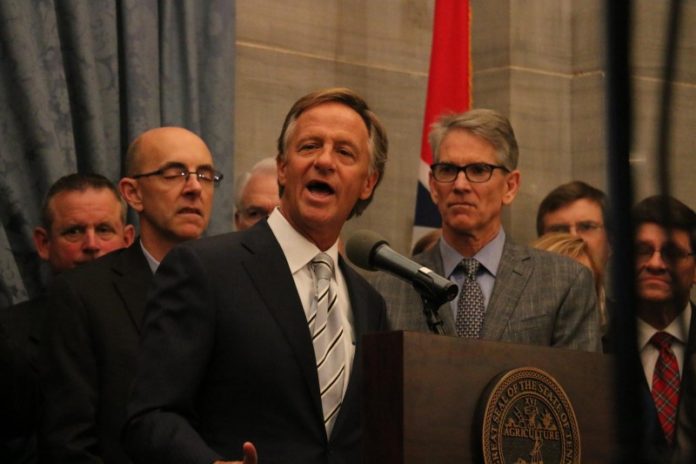It’s been long awaited, but Gov. Bill Haslam finally released his first piece of what’s on his agenda for the recently convened legislative session.
Titled the “Improve Act,” Haslam aims to help improve the state’s transportation infrastructure, with the hope of creating sustainable road funding for Tennessee.
“This is the first step in a long process,” Haslam said. “We are excited to have the conversation begin.”
The legislation cuts $270 million annually in taxes. But it will also include a 7-cent-per-gallon increase on the gasoline tax, which hasn’t been raised since the late 1980s, and a 12-cent increase on diesel fuel.
For Tennesseans using gasoline to fuel their cars, that means on average spending $4 a month more. The current rate is 21.4 cents per gallon. According to the State Comptroller’s Office, that is only worth 11 cents compared to its value when the rate was last set. Money from the gas tax goes to the Tennessee Department of Transportation to fund infrastructure statewide.
missing or outdated ad configIn addition, car registration fees would go up $5 per passenger vehicle. It would place an annual road fee of $100 on electric vehicles or those using alternative fuels.
Haslam’s plan would cut sales taxes on groceries from to 4.5 cents, making a total cut to the sales tax on food of 1 percent.
The Improve Act would bring $278 million new dollars to the state.
Cities – including the six in Williamson County – will receive an additional $39 million, which is a 40 percent increase. Counties would receive an additional $78 million for local projects, allowing them to keep property and other local taxes low.
The plan also details 962 projects in all 95 counties. It would mean 45 projects to improve interstates; 89 to improve access in rural communities; 51 geared toward economic opportunities; 162 bridges replaced on state highways; and 526 bridges to replaced on county roads.
“We’ve been working a long time on this,” TDOT Commissioner and Franklin resident John Schroer said. “When I got this job, we had a hard time with the federal government. This is a culmination of a lot of work. It’s time that we look at long-term funding. This is something that could be accepted by Tennesseans and the legislature. I think it will help Tennessee go to the future, that’s what we are looking for.”
So what does that mean for Williamson County?
Both Williamson Mayor Rogers Anderson and Franklin Mayor Ken Moore stood on stage behind Haslam as he presented the plan.
“The first thing you have to look at for his proposal is what the means for us here in Williamson County,” Anderson said. “The total for Williamson County will be somewhere in the $1.3 million range based on the additional fees that are being proposed.”
Within the governor’s plan is room for municipalities to decide on whether they would like to host a referendum to use a portion of the sales tax toward transit in their community.
“It’s all plus-plus for communities who need to address their needs and it gives you an opportunity to do that,” Anderson said “Now we can hear from the local citizens if they do or don’t want it. But it’s a good thing for Williamson County. This is the hub of growth. If you have good roads, and you’ve cut taxes on the manufacturing and some other areas, and you have good schools? You’re going to have a solid community. It gives us an opportunity as city and county mayors to get behind it, so I am behind it.”
According to TDOT’s projects report, the county is in need of 20 projects right now, from state highway widenings to bettering bridges.
So, could this pass in the legislature?
Williamson County sits in an interesting position, given it has Majority Leader Glen Casada carrying the governor’s legislation.
“I owe the governor the respect to present this plan, and whatever comes out of committee is what I will be voting for on the House floor,” Casada said.
The Thompson’s Station Republican said he anticipates other members of the legislature to derive their own plans. Knowing that, Casada was relatively neutral, having a wait-and-see attitude.
“This is the number-one and most important issue,” he said. “I am glad he is taking this on. He could have said we were done for two years. I am committed to do something. The governor has presented his plan, and the legislature will look at this plan. But I do expect the legislature to come up with their own plan.”
He said one member had started a plan, but wasn’t ready to present it. The chairman of the Transportation Committee Chairman Rep. Barry Doss (R-Leoma) also was contemplating a plan.
“It would rely on cutting the sales tax on food of the nickel and deleting it all together,” Casada said. “That would be a tax swap as well. We will see. I am anxious to hear it.”
Rep. John Ray Clemmons (D-Nashville) has said he also has plans to file legislation that would be an alternative tax plan to that of the governor’s.
The legislature will reconvene Jan. 30, where representatives and senators will start hashing out the plan.
“I think when I say I want to find a dedicated source for roads, everyone’s with me,” Casada said. “There will be varied opinions. Do we shift sales tax around? Do we fund it that way? As long as it is tax neutral I could definitely support it. But I will be voting for something.”
Emily West covers Franklin, education and the state legislature for the Franklin Home Page. Contact her at emily@franklinhomepage.com. Follow her on Twitter via @emwest22.


